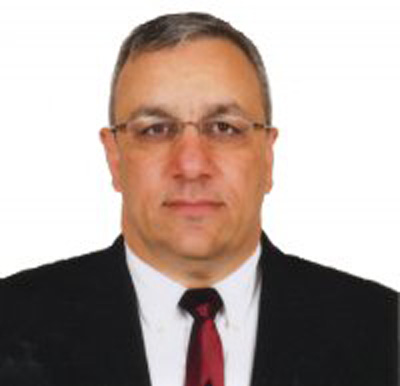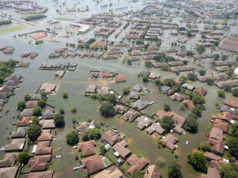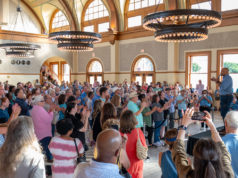The Jan. 6 raid on the U.S. Capitol is now widely seen as the biggest intelligence failure since 9/11. Federal, state, and local authorities have identified and charged more than 230 suspects in the violent insurrection that left five people dead, including one U.S. Capitol Police officer. Federal prosecutors said more than 400 investigations remain active.
A U.S. Capitol Police spokesperson recently said six officers have been suspended with pay and 29 are under investigation for potentially colluding with rioters.
Longtime CIA officer Robert Grenier recently told NPR that the United States may be facing the beginning of a long-term, violent insurrection by extremists who have been emboldened by the Trump presidency’s racist rhetoric and policies and the recent surge in misinformation surrounding the 2020 presidential election.
“I don’t want to be one to suggest that somehow the United States is going to in any way resemble Iraq or Afghanistan at the height of violence,” Grenier said. “As in any insurgency situation, you have committed insurgents who are typically a relatively small proportion of the affected population, but what enables them to carry forward their program is a large number of people from whom they can draw tacit support. That’s what I’m primarily concerned with here. I think what is most important is that we drive a wedge between those violent individuals and the people who may otherwise see them as reflecting their interests and fighting on their behalf.”
The convergence of numerous right-wight groups (Proud Boys, QAnon followers, neo-Nazis, anarchists, white supremacists, and others) during the attack may reflect a broader alliance among extremist groups. One former FBI agent who currently teaches at TCU, Samuel Simon, said growing political divisions among U.S. citizens have fueled extremism on both ends of the political divide.
“I think what has been happening in the country for the last 10 to 15 years is that we’ve become far more polarized,” he said. “It’s hard to be a centrist in the United States. I don’t see it becoming better any time soon.”
The 2020 riots in Seattle and Portland following the murder of George Floyd and the attack on the capitol demonstrate an increasing willingness on the part of certain groups to resort to violence, he said.
The proliferation of misinformation and baseless conspiracy theories has emboldened extremist groups, he continued, and many of those false narratives are propagated and promoted by Russian and Chinese government groups as a means of dividing and weakening the United States.
In 2018, the Weekly documented a group of around 20 Proud Boys who had gathered at Ye Olde Bull and Bush (“Proud Boys Crash Local Pub,” Sept. 2018). Tony Green, a Black man, described the conversations on the part of the Proud Boys as centered on “oppressing women.” The Star-Telegram documented supporters of QAnon, the discredited far-right conspiracy theory that alleges members of the Democratic Party are part of a global child sex-trafficking ring, protesting local mask mandates last summer, and the Star-T documented several North Texas residents who participated in the Jan. 6 breach of the U.S. Capitol.
Simon, who headed the Fort Worth Joint Terrorism Task Force from 2005 to 2012, said law enforcement is limited when it comes to investigating domestic terrorism, and government officials are quick to identify international terrorism threats as a greater priority.
“We are afraid to turn a mirror on ourselves,” he said. “It is easier to say Al Qaeda or ISIS in Syria, Iraq, and Afghanistan are a far bigger threat. Timothy McVeigh, what he did was horrific,” he said, referring to the white supremacist’s 1995 Oklahoma City bombing that killed 168 people.
Fort Worth police spokesperson Daniel Segura said his department maintains a dedicated anti-terrorism task force.
“The Homeland Security unit works with local, regional, and state departments,” he said. “When we have huge events like the Stock Show and Rodeo every year that bring around a million people every week, they monitor any local or outside threats. The program has been active for several years.”
The prolific use of social media by extremist groups allows the task force to prevent potential acts of terrorism, he added.
“With social media, we have many resources to tap into and look for keywords,” he said. “If it ties back to Fort Worth, we will look at it right away.”
Segura said the Fort Worth police department has not seen any activity that would suggest an imminent attack from any group. The task force, he said, looks for dangerous groups of all political and ideological persuasions.
“We are on the lookout for anything suspicious in Fort Worth,” he said. “We haven’t seen any increase of activity.”
Unlike most Western countries, the United States differentiates between acts of international and domestic terrorism, Simon said. The lack of criminal penalties for committing acts of domestic terrorism severely limits law enforcement’s ability to investigate or intervene until an actual crime has occurred. Part of the reason for limiting the federal government’s ability to investigate American citizens is tied to the FBI’s history of investigating Martin Luther King Jr. and other civil rights leaders for political reasons, he said.
“We are terrified to give the government the ability to say the Animal Liberation Front, anarchists, the KKK, or the new Black Panther Party” should be designated terrorist organizations, he said.
According to a 2020 report from the Center for Strategic and International Studies, a U.S. think tank, over the past two decades, right-wing terrorist attacks caused 335 deaths while left-wing attacks left 22 people dead. In contrast to right-wing attacks, according to the findings, left-leaning groups tend to target property rather than people.
Simon said it would be a difficult task to decide at what point a hate group becomes a terrorist organization, but, unlike the United States, most countries have no problem labeling domestic extremist groups as terrorists.
From an FBI perspective, “let us do our job,” he said. “Attach a punishment to the definition of domestic terrorism. You don’t have to redefine domestic terrorism. If anyone knowingly or willingly violates these statutes, they should be subject to imprisonment or fines of whatever [the criminal justice system] feels is appropriate. We could start charging people as domestic terrorists” when it’s called for.













Will the media ever stop refering to the death of George Floyd as anything other than the murder of George Floyd?